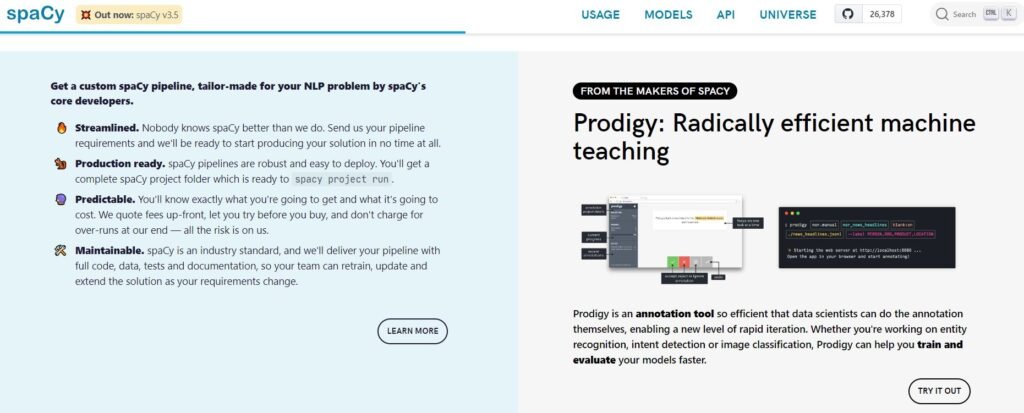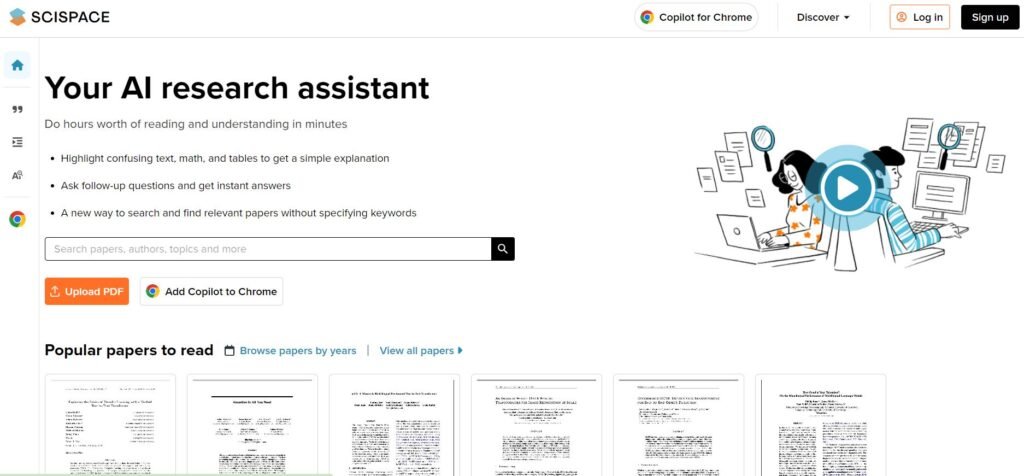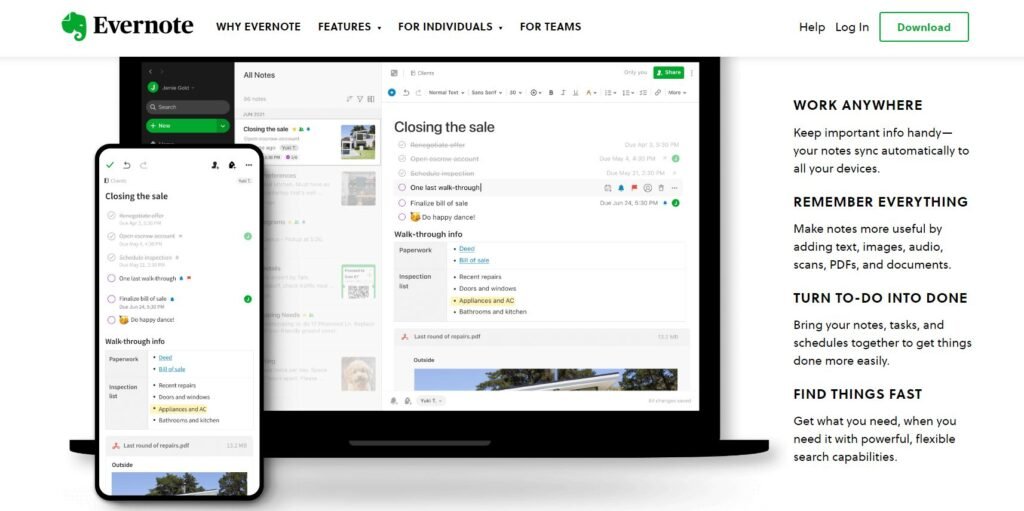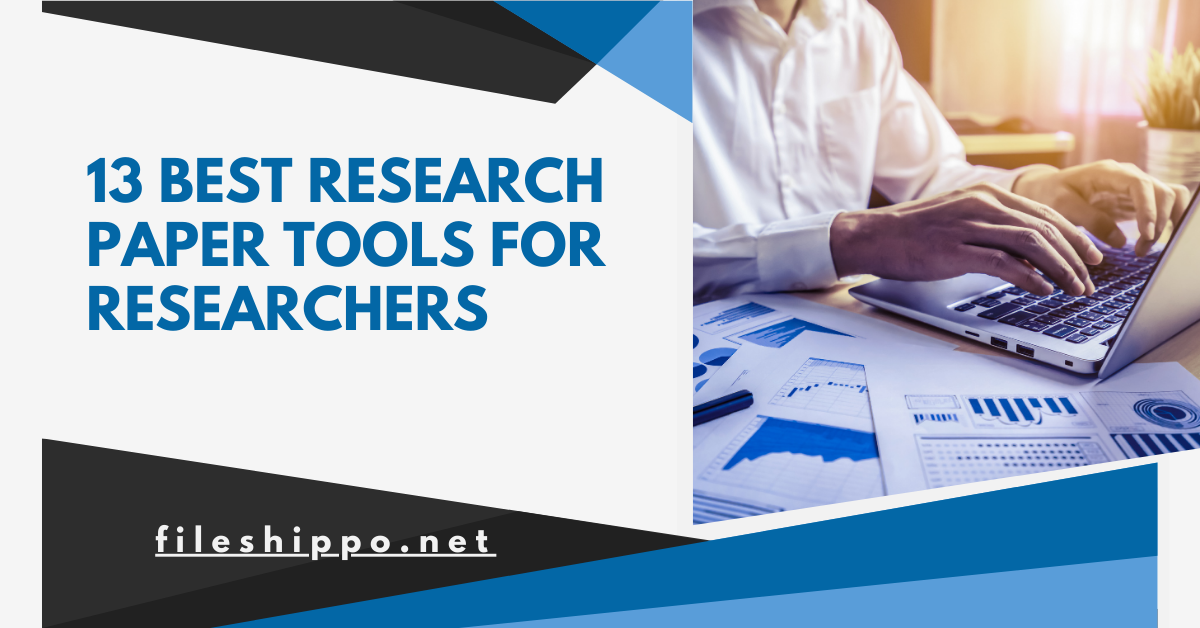In the present age, research paper reading tools have become a vital component of scholarly research. These research tools are designed to enhance the research process, making it more efficient and effective for researchers.
Research paper reading tools have gained immense popularity in the academic world in recent years. These tools are designed to help researchers, scholars, and students with their research. With the help of these tools, researchers can easily search for relevant research papers, analyze and organize research data, and easily collaborate with other researchers.
Also Read: Top 6 Best Data Preprocessing Tools: Streamline Your Data Analysis
Table of Contents
13 Best Research Paper Reading Tools
ResearchGate
ResearchGate is a popular academic social network where researchers can share papers, ask questions, find collaborators, and discover the latest research and jobs. ResearchGate is funded by advertising and venture capital. ResearchGate provides up-to-date with the latest research, methods, tools, career info, and news in your discipline.
Features
- Plan and manage your research projects and workflows.
- Build your profile to establish your academic reputation and networks.
Citation Gecko
Citation Gecko is an academic citation management tool designed to help researchers discover, organize and cite sources for their papers. It can automatically generate citations for imported sources in various citation styles, including APA style, MLA style, Chicago style, Harvard style, and more.
Features
- Allows plagiarism checking, and keyword searching within the source text.
- Version control for citations, and metrics on types of work.
Citation Gecko focuses on helping researchers discover academic sources, organize them into logical sequences, and automatically generate citations so writers can focus on drafting the actual paper content and prose.
Iris.ai
Iris.ai is an AI-powered research assistant platform that helps researchers discover, organize and write academic papers. Help Search and find scholarly papers, books, datasets, authors, journals, and more based on keywords, titles, abstracts, references, and researcher profiles. The free plan provides basic search, organizing, citation, and collaboration functionality with limited storage.
Features
- Create projects, folders, lists, and connect related work.
- Collaborate by sharing access to research sources and discussions with other scholars and students.
Google Scholar
Google Scholar is a search tool for scholarly literature, including academic papers, books, abstracts, and court opinions from scholarly publishers, professional societies, universities, and other academic organizations. You can Get alerts when new papers are published by authors/topics of interest. Let the facility see how often each publication has been cited by other scholarly literature.
Features
- Provides open access to academic research.
- The primary goal is to help researchers discover relevant and significant work.
- Save and organize search results by exporting links or URLs to reference managers like Zotero, Mendeley, or RefWorks.
GATE (General Architecture for Text Engineering)
GATE (General Architecture for Text Engineering) is an open-source text engineering framework maintained by researchers that process large canons of unstructured text documents. It is used to train and apply machine learning models for text classification, clustering, summarization, and more.
Features
- Integrate third-party plugins and NLP components.
- Visualize and explore relationships in your text data using graphs, tree structures, concept maps, ontologies, etc.
SpaCy

SpaCy is a popular commercial NLP library focusing on industrial applications that allow machine translation between parallel canons. Also, summarize sentiment analysis, and question answering. Scales on very large datasets and complex problems. Integrates with popular Python data science and machine learning libraries like Pandas, NumPy, Scikit-learn, etc.
Features
- Requires chaining tools in a broader area.
- Easy to build and train custom ML models.
- Trusted by major companies for high-volume production.
Scholarly
Scholarly is a citation management tool focused on helping researchers write and format papers. Import citations for books, articles, websites, videos, datasets, and more from multiple library databases and search engines like Google Scholar, PubMed, JSTOR, and Crossref. It can Generate bibliographies and reference lists in various citation styles.
Features
- Write and edit papers directly within the Scholarcy interface using a built-in text editor.
- Collaborate by sharing access to citation libraries and syncing edits/changes in real-time with co-authors.
Scrivener
Scrivener is a popular writing and productivity tool for authors, academics, students, and researchers. It can build outlines and structures to represent the flow and content of your writing. Compile documents into final drafts with built-in compilation and layout features. Use multimedia and interactive elements like images, tables, charts, hyperlinks, etc.
Features
- Create tables of contents, indexes, cross-references, and more.
- Expand an outline node to automatically generate a corresponding document section with subheadings.
Mendeley
Mendeley is a citation management tool and research network. You can follow researchers, topics, journals, publishers, and more to get alerts when they publish new work. It lies on the top of new research by following interested authors, topics, journals, or colleagues. It provides Discounts for students, non-profits, and groups.
Features
- Allows styling/formatting options.
- Engage with experts in your field and discover emerging areas of research.
Sci space (formerly Typeset)

Scispace (formerly Typeset) is a cloud-based writing and formatting tool for academic use cases. Sync formatting and style across files and automatically generate tables of contents, indexes, cross-references, and citations.
Features
- Represent outlines or logical progressions.
- Tools for compiling papers from multiple drafts or sources.
- Collaborate in real-time by sharing access to folders, collections, and discussions.
Evernote

Evernote is a popular note-taking app for research, writing, organizing projects, and productivity. Evernote allows importing notes, files, web pages, emails, images, and more into notebooks, folders, tags, and sequences. Apply basic formatting to text and attach or embed multimedia files as needed.
Features
- Import from or export to other applications.
- Allow search option for notes, reminders, comments, encryption, and Third-party.
- Aims broadly at productivity, that is, suitable work environments for personal and professional cases.
Open Knowledge Maps (OKM)
Open Knowledge Maps (OKM) is an open-source tool for visual knowledge management. It allows creation of mind maps, concept maps, knowledge graphs, and other visual knowledge representations to organize ideas, information, activities, and resources.
Features
- Allowing multiple users to edit a single map simultaneously.
- Built on open standards and available on GitHub for modification and extension.
Bit.ai
The Bit.ai is a collaborative knowledge management tool that organizes workflows, activities, and tasks. Schedules and assign tasks, timers, reminders, checkpoints, and milestones to keep members, groups, or projects on track. Using Bit’s read-later feature, Annotate and highlight important phrases or topics within files, web pages, articles, or other content.
Features
- Collect and organize highlights from across your reading material.
- Create visual workflows to represent processes, methodologies, project lifecycles, or other structured progressions of steps.
How to choose the Right Research Paper Tool
Determine your needs. Think about how you want to use the tool. Will you be reading long papers offline? Need annotation and citation tools? Want options for organizing and taking notes? Choose a tool that aligns with your key use cases.
- Consider your platform preferences: Research paper tools are available for web, mobile (iOS/Android), desktop (Windows/Mac), and more. Ensure the tool supports your preferred devices and platforms to stay organized across them.
- Evaluate reading experience: Distractions, interface clutter, readability, and eyestrain are important for long-form reading. Choose a tool for reading research papers and books with features like dark mode, immersive mode, adjustable text size, etc.
- Check annotation and note-taking capabilities: If you plan to heavily annotate research papers or capture notes and thoughts, look for tools for highlighting, commenting, tagging, flagging key terms, etc. Consider integration with citation tools too.
- Review outlining and organizing features: Decide if you want to be able to create outlines, sections, hierarchies, mind maps, or other structures to organize your papers and ideas. Look for tools with an outliner, mind mapping, and Wiki-style features.
- See citation generators and bibliography tools: For formally citing sources in your papers, choose a tool that integrates with citation generators and automatically generates reference lists and bibliographies in your desired citation style (APA, MLA, Chicago, etc.).
- Look at collaboration options: Some tools allow real-time collaboration with others viewing and annotating the same paper. This can be useful for group assignments or discussions. Consider if collaboration features are important for your needs.
- Check reviews and comparisons: Search online for reviews and comparisons of the research paper tools you are evaluating. See real opinions on usability, features, strengths, weaknesses, and recommendations from other students and researchers.
- Try before you buy: Many tools offer free trials or web versions you can use to try them out with your own papers before paying. Use free trials to experience each tool’s interface, features, and integrations first-hand with your actual course materials.
- Consider mix-and-match options: No single tool has every feature, so you may need to combine multiple tools to get all your desired capabilities. Look for options that integrate well with other tools or are at least compatible enough to allow importing/exporting between them.
In conclusion, research paper reading tools are essential to literary research in the digital age. Research tools offer numerous benefits to researchers, such as easy access to research papers, efficient organization of research data, collaboration with other researchers, time-saving, and enhanced research quality. Therefore, it is highly recommended that researchers utilize research paper reading tools to improve their research process.
FAQs
What are research paper reading tools?
Research paper reading tools are software applications designed to help researchers search for, analyze, and organize research papers.
How can research paper reading tools help scholars in their research work?
Research paper reading tools can help scholars in their research work by providing easy access to research papers, efficient organization of research data, collaboration with other researchers, time-saving, and enhanced research quality.
What are some popular research paper reading tools?
Some popular research paper reading tools include Mendeley, Zotero, EndNote, and Papers.
Are research paper reading tools free?
Many research paper reading tools are free, while some may require a subscription or purchase.
Can research paper reading tools be used for any research field?
Yes, research paper reading tools can be used for any research field if relevant research papers are available in digital format.









